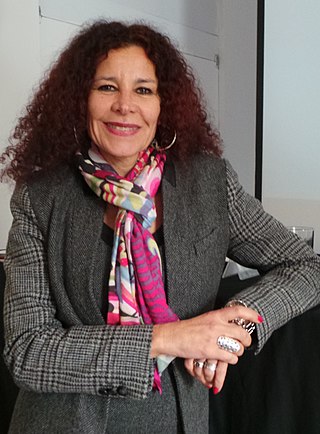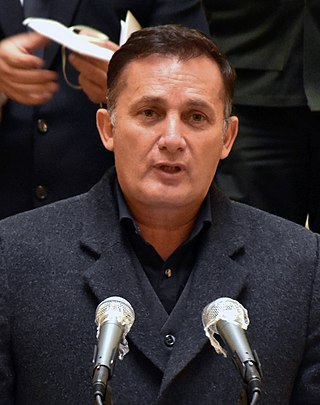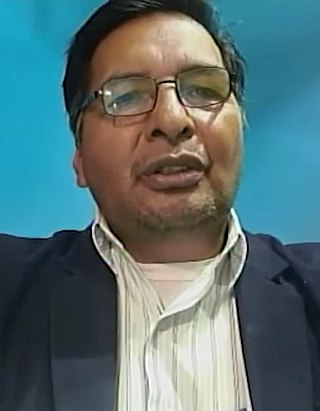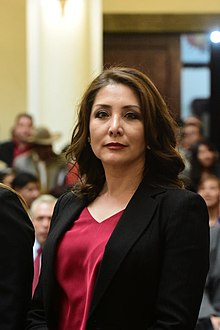
Elizabeth Cristina Salguero Carrillo is a Bolivian diplomat, journalist, politician, and women's rights activist who served as minister of cultures from 2011 to 2012. A member of the Movement for Socialism, she previously served as a party-list member of the Chamber of Deputies from La Paz from 2006 to 2009. In 2009, she was elected as a substitute party-list member of the Chamber of Deputies from La Paz but resigned before taking office in order to launch an ultimately unsuccessful La Paz mayoral campaign. From 2012 to 2015, she served as ambassador of Bolivia to Germany, and since then has worked as an international expert in strategic planning at UN Women.

The Ministry of Cultures, Decolonization, and Depatriarchalization is the ministry of the government of Bolivia that provides for the preservation and protection of the cultures and artistic expressions of the indigenous peoples of Bolivia as well as promotes the country's tourism sector and process of decolonization and depatriarchalization.

Luis Alberto Arce Catacora, often referred to as Lucho, is a Bolivian banker, economist, and politician serving as the 67th president of Bolivia since 2020. A member of the Movement for Socialism, he previously served as minister of finance—later minister of economy and public finance—from 2006 to 2017, and in 2019.

Adriana Salvatierra Arriaza is a Bolivian political scientist and politician who served as president of the Senate in 2019. A member of the Movement for Socialism, she served as senator for Santa Cruz from 2015 to 2020 and was a substitute senator for Santa Cruz under Carlos Romero in 2015. At age twenty-nine, Salvatierra was the youngest legislator and third woman to hold the presidency of the Senate and was the youngest individual to ever exert presidential authority, albeit briefly in an acting capacity.

Jeanine Áñez Chávez is a Bolivian lawyer, politician, and television presenter who served as the 66th president of Bolivia from 2019 to 2020. A former member of the Social Democratic Movement, she previously served two terms as senator for Beni from 2015 to 2019 on behalf of the Democratic Unity coalition and from 2010 to 2014 on behalf of the National Convergence alliance. During this time, she served as second vice president of the Senate from 2015 to 2016 and in 2019 and, briefly, was president of the Senate, also in 2019. Before that, she served as a uninominal member of the Constituent Assembly from Beni, representing circumscription 61 from 2006 to 2007 on behalf of the Social Democratic Power alliance.

Arturo Carlos Murillo Prijic is a Bolivian businessman, hotelier, and politician who served as the minister of government from 2019 to 2020. As a member of the National Unity Front, he previously served as a senator for Cochabamba from 2015 to 2019 and as a plurinominal member of the Chamber of Deputies from Cochabamba from 2006 to 2010.

Oscar Miguel Ortiz Antelo is a Bolivian businessman and politician who served as minister of economy and public finance from July to September 2020 and as minister of productive development from May to July 2020. As a member of the Social Democratic Movement, he previously served two terms as a senator for Santa Cruz from 2015 to 2020 on behalf of the Democratic Unity coalition and from 2006 to 2010 on behalf of the Social Democratic Power alliance. Nearing the end of his second term, Ortiz was his party's presidential candidate, attaining fourth place in the annulled 2019 general elections. During his first term, he served as president of the Senate from 2008 to 2010, the last opposition legislator to preside over the upper chamber as of 2025. Outside of national politics, Ortiz served as president of the Union of Latin American Parties from 2018 to 2021 and has been the rector of the Bolivian Catholic University at Santa Cruz since 2021.

Yerko Martín Núñez Negrette is a Bolivian agronomist and politician who served as minister of the presidency from 2019 to 2020. A member of the Social Democratic Movement, he previously served as minister of public works from November to December 2019. Throughout his ministerial tenure, Núñez was noted as a key person of influence in the transitional government and a "right-hand" to President Jeanine Áñez, a fellow Beni native. Prior to his appointment, he served as senator from Beni from 2015 to 2019 on behalf of the Democratic Unity coalition. As a member of Beni First, Núñez served as mayor of Rurrenabaque from 2010 to 2014; he previously held the position for two terms from 2000 to 2003 and 2005 to 2010 as part of the Revolutionary Nationalist Movement. Núñez's mayoral tenure saw strides made for Rurrenabaque's ecotourism industry, which generated increased economic growth for the city.

María Nela Prada Tejada is a Bolivian diplomat and politician serving as the minister of the presidency since 2020. A member of the Movement for Socialism, she served as chief of staff under Luis Arce during his tenure as minister of economy from 2006 to 2017 and in 2019.

Luis Fernando López Julio is a Bolivian businessman, retired military officer, and politician who served as minister of defense from 2019 to 2020. Appointed in the tail end of the 2019 political crisis, López, along with Minister of Government Arturo Murillo, quickly became characterized as the "strong men" of the Jeanine Áñez administration and were implicated in the deadly events at Senkata and Sacaba. López was called to hearings by the Plurinational Legislative Assembly but failed to present himself three consecutive times, ultimately resulting in his censure by the legislature. As per the terms of the Constitution, he was dismissed as minister but, exploiting a loophole in the document's text, he was reappointed just a day later. Soon after, reports revealed his participation in the tear gas case, which accused the ministries of government and defense of irregularly purchasing non-lethal weapons at inflated prices.

Fernando Iván Vásquez Arnez is a Bolivian geotechnical and mining engineer and politician who served as minister of mining and metallurgy from 8 May to 30 May 2020. He previously served as vice minister of productive development and metallurgical mining from 2019 to 2020 and as director of the environment and public consultation from 2006 to 2011. Shortly into his ministerial term, Vásquez stated that his white complexion made him incapable of being a member of the Movement for Socialism, causing broad condemnation and his removal from office less than a month after being appointed.

The Arce Cabinet constitutes the 222nd cabinet of the Plurinational State of Bolivia. It was formed on 9 November 2020, one day after Luis Arce was sworn in as the 67th president of Bolivia following the 2020 general election, succeeding the Áñez Cabinet. The cabinet is composed entirely of members of the ruling Movement for Socialism. Described as a "technocratic" cabinet, it has been noted for the low-profile and youth of some of its members as well as its political distance from former president Evo Morales.

The Ministry of the Presidency is the department of the Government of Bolivia that provides support to the presidential administration by coordinating its political-administrative actions with the different ministries as well as the legislative, judicial, and electoral branches of government in addition to social sectors and cooperatives. Aside from these tasks, the ministry acts as the chief custodian of the government, filing all laws, decrees, and resolutions and publishing them in the Official Gazette of Bolivia.

Adrián Rubén Quelca Tarqui is a Bolivian politician, professor, and trade unionist who served as minister of education from 2020 to 2021. A member of the Communist Party, Quelca worked to implement a project for a "semi-present" school system in which partial in-person learning would be coupled with radio and tele-education. Under his management, schools previously closed early by the past administration were reopened to blended learning for the 2021 year. Despite initial hopes for fully in-person classes by the second half of the year, results never panned out, and his administration was hampered by an ongoing corruption investigation that ultimately culminated in the presentation of charges and his resignation on 12 November 2021.
Cielo Jazmín Veizaga Arteaga is a Bolivian footballer and politician serving as vice minister of sports since 2020. Veizaga's swift rise to fame, joining the country's U20 team at age fourteen and becoming the youngest member of President Luis Arce's administration at nineteen, has been met with acclaim despite accusations of inexperience in her State portfolio.
Events from the year 2022 in Bolivia.

Carolina Ribera Áñez is a Bolivian dentist who served as the presidential representative in the Social Support and Management Unit of the Ministry of the Presidency from 2019 to 2020 under then-President Jeanine Áñez. Ribera is the eldest daughter of Áñez and former Trinidad mayor Tadeo Ribera. Carolina protests Áñez's incarceration on various criminal charges in 2021, denouncing alleged violations of her mother's human and legal rights.

Martha Yujra Apaza is a Bolivian politician and trade unionist who served as minister of cultures and tourism from 2019 to 2020. A prominent trade union leader in El Alto, Yujra was the only indigenous member of the Jeanine Áñez Cabinet and was the final official to head the Ministry of Cultures and Tourism; the institution was abolished during her term. During her tenure, Yujra's office primarily dealt with the effects of the COVID-19 pandemic on the cultural sector, devising means of alleviating the economic ramifications of quarantine measures on artisans and entertainers. She subsequently served as a counselor at the Embassy of Bolivia in Quito from July to November 2020. Prior to serving as minister, Yujra gained notoriety for her fierce opposition to the government of Evo Morales. In 2017, she led a breakaway faction of the pro-government El Alto Regional Workers' Center. As its executive secretary, Yujra aligned the union with the Bolivia Says No alliance, running unsuccessfully to represent La Paz in the Chamber of Deputies in the annulled 2019 general elections.

Beatriz Eliane Capobianco Sandoval is a Bolivian lawyer and politician who served as minister of rural development and lands from January to November 2020. A member of the Social Democratic Movement, she previously served as a party-list member of the Chamber of Deputies from Santa Cruz from 2015 to 2019 on behalf of the Democratic Unity coalition. Before that, she served as a member of the Constituent Assembly from Santa Cruz, representing circumscription 51 from 2006 to 2007 on behalf of the Social Democratic Power alliance. A professional in cadastre and land and real estate registration, Capobianco held numerous positions linked to Santa Cruz's agribusiness sector, including serving twice as departmental director of the National Institute of Agrarian Reform, first from 2001 to 2002 and again from 2019 to 2020.

María Elva Pinckert Vaca is a Bolivian businesswoman, lawyer, and politician who served as minister of environment and water from 2019 to 2020. Pinckert developed her career in Santa Cruz's agro-industrial heartland, during which time she rose to key positions of regional economic and political influence, including presiding over the Montero Civic Committee and serving as vice president of the Santa Cruz Chamber of Industry and Commerce. Elected to the Montero Municipal Council as a member of the Revolutionary Nationalist Movement in 1999, Pinckert later switched to the New Republican Force, with which she won reelection. In 2009, the party promoted her to the Senate as a substitute senator under Germán Antelo. Amid the disunity brought about by the fragmentation of her parliamentary caucus, Pinckert aligned with the Social Democratic Movement, which nominated her for a full Senate seat. Elected in 2014, Pinckert held office until 2019, when she joined the Áñez administration as head of environmental and water policy. As with many former Áñez ministers, Pinckert faced judicial consequences for her collaboration with the transitional government, leading her to seek refuge in Brazil less than a year after leaving office.




















